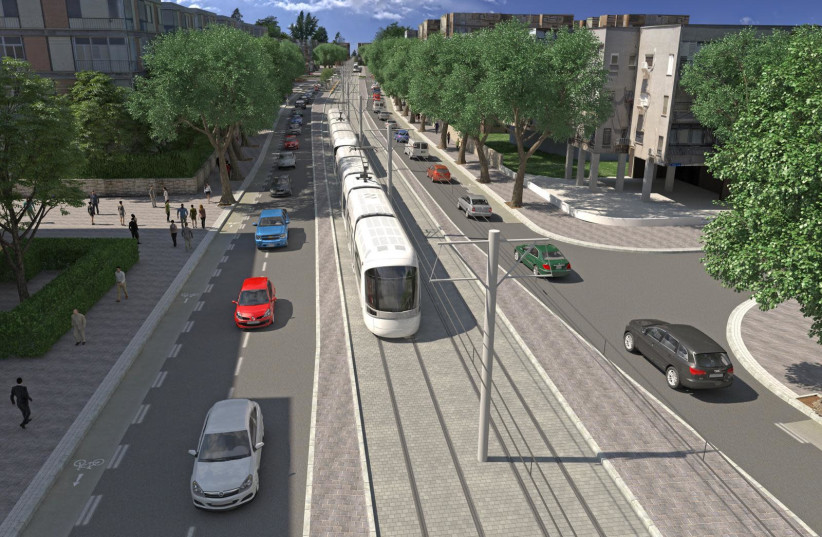Transportation Minister Merav Michaeli is working to allow the Tel Aviv light rail to operate on Shabbat, her office said Wednesday, sparking ire from right-wing parties and joy from centrist and left-wing movements.
She instructed Mia Likvarnik, chair of NTA Metropolitan Mass Transit System, the company that is building the light rail in Tel Aviv, to conduct an analysis of operational and budgetary implications to enable the light rail to run on Saturdays once it launches in November.
If the line does not run on Shabbat, it would significantly harm citizens who do not own a private vehicle, said Michaeli, leader of the Labor Party. The large investment being put into the light-rail system justifies it being used seven days a week, she added.
Since its establishment, Israel has refrained from allowing public transportation on Shabbat. The issue has long served as a point of contention between secular communities and haredi (ultra-Orthodox) politicians who have pledged the “preservation of Shabbat” in their election campaigns.
"I have always believed that the freedom of movement of the citizens of Israel should not be restricted, not by day, not by hour, not by any means of transportation, private vehicle or public bus."
Transportation Minister Merav Michaeli
“The citizens of Israel deserve that the blockade on the weekend ends,” Michaeli said. “I have always believed that the freedom of movement of the citizens of Israel should not be restricted – not by day, not by hour, not by any means of transportation, private vehicle or public bus.”
“Today, more and more of the Israeli public needs public transportation during the weekend, wants it, and many of those who will not use it, support it,” she said. “It is our duty to make it happen and to reduce the gap between those who own a private car and those who don’t, as well as to help get vehicles off the road and make the change that the State of Israel in 2022 so desperately needs.”
“I call on the prime minister not to waste the historic window of opportunity that has opened up for us and to join me in changing the face of public transportation in Israel,” Michaeli said.

Michaeli's announcement sparks mixed reactions from Israeli leaders
Ne’emanei Torah Va’Avodah, a Modern Orthodox movement, said Michaeli should reach a comprehensive arrangement that is acceptable to the majority of the public.
“A comprehensive arrangement acceptable to the majority of the public must be reached in the spirit of the various beliefs, which include the operation of limited public transportation on Shabbat and the opening of entertainment and cultural institutions,” the movement said. “At the same time, and as an integral part of this move, the closure of trading and shopping activities will be determined. We believe that it is forbidden for the operation of public transportation on Shabbat to come unilaterally and detached from the overall regulation of the public space on Shabbat.”
Darkenu, a nonpartisan civil-society movement that approached Michaeli with a petition earlier this week calling for the light rail to run on Shabbat, welcomed her announcement.
“Families without a car, young people without a driver’s license, students and anyone who wants to travel by public transportation on the weekend are left without a solution. For us this is a redline,” attorney Alva Kolan wrote in an appeal accompanying the Darkenu petition. “We ask that you work to promote an outline for operating the line on Shabbat in a way that will allow the population that wants it to use it, without harming the sanctity of Shabbat in haredi cities. Each and every one of us is entitled to celebrate and experience Shabbat in our own way.”
Religious Zionist Party MK Itamar Ben-Gvir, leader of the Otzma Yehudit faction, criticized Michaeli’s announcement.
“I suggest that Merav Michaeli start dealing with Israel’s difficult transportation issues on weekdays before she goes looking for provocations on Shabbat,” he said. “Instead of worrying about the problem of traffic jams and accidents, Michaeli is looking for easy headlines – once by engaging in temper tantrums on the train and now by desecrating Shabbat and harming the Jewish identity of the country. Maybe it’s better that she stick to what she’s good at – TikTok.”
Shas also criticized the announcement.
“The transportation minister is trying to cover up the disgraceful failure of her tenure in all areas, through a cynical election campaign at the expense of the precious Shabbat and the Jewish character of the country. Disgraceful,” it said in a statement.
Religious Zionist Party leader Bezalel Smotrich said Michaeli was a “failed transportation minister.”
She decided to “trample on Shabbat in the State of Israel and harm the Jewish identity of the country as part of her election campaign,” he said.
“The upcoming elections are about whether the State of Israel will remain a Jewish and democratic state or, God forbid, will become a state for all its citizens led by the progressive Left along with the supporters of terrorism,” Smotrich said. “We will not let them [do this].”
